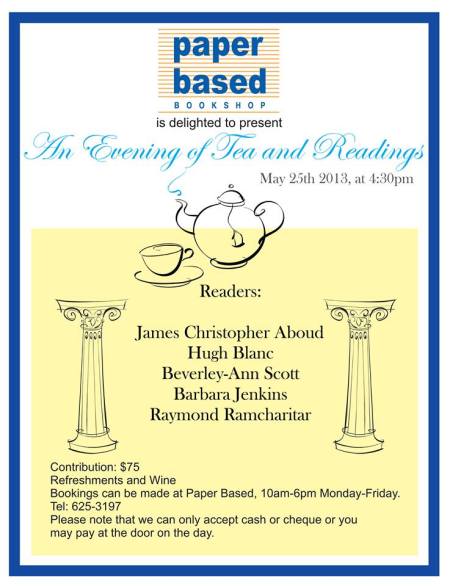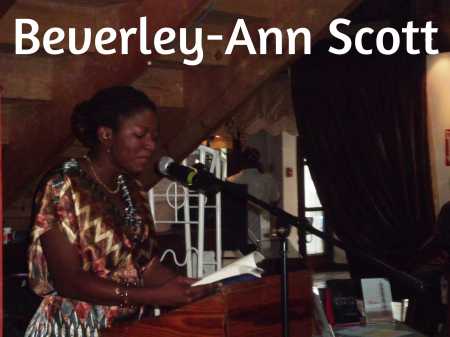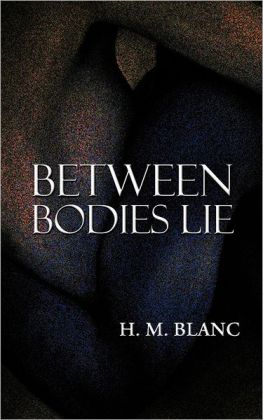by Shivanee Ramlochan, Paper Based Blogger

Official event flyer, designed by Kevin Hackshaw.
Dear Friends of Paper Based,
As the shop’s proprietress, Joan Dayal, said in her opening remarks at our most recent Evening of Tea and Readings, we’ve so much to celebrate, in terms of Caribbean writers, books, and publishers. Ms. Dayal saluted the unflagging endeavours of NGC Bocas Lit Fest founder, Marina Salandy-Brown, who was front and centre in the capacity-filled foyer at the Normandie last Saturday. The Bocas Team, Dayal said, has worked tirelessly to promote books written and supported within the Caribbean and abroad.

Joan Dayal delivers opening remarks to the audience.
It is precisely this spirit of bookish inclusiveness that Paper Based hopes to foster and encourage, with the Tea and Reading series. This third evening of readings for 2013 featured the works of five published writers: James Christopher Aboud; Beverley-Ann Scott; Barbara Jenkins; Raymond Ramcharitar and Hugh Blanc.

The evening’s first reader was poet James Christopher Aboud, who shared selections from his second collection of poetry, Lagahoo Poems, first published in 2004 by Peepal Tree Press. The collection is defined, Aboud said in a preface to his readings, as a series of devotions on “shapeshiftedness”. In the folklore of Trinidad and Tobago, the lagahoo or li gahoo is a shapeshifter, a creature capable of morphing into multiple forms, including that of a headless man bearing a wooden coffin. “Wind, Water, Fire, Men,” the first piece read by Aboud, was a favourite of the late Trinidadian author and literary mentor, Wayne Brown. Aboud also shared selections from his work in progress.

Reading in second place, author and medical doctor Beverley-Ann Scott shared a series of passages from her second novel, Is America She Gone?, published in 2012 by AuthorHouse. The novel tells the story of Sandra, a struggling single mother who emigrates illegally to the United States, in hope of providing a better life for the children she leaves behind in Trinidad. Among the excerpts shared by Scott were comparisons between the polite chill of autumn rain in Brooklyn, versus the unbiddable rudeness of Trinidad’s showers. Scott’s first novel, The Stolen Cascadura, was the focus of NALIS’s 2012 One Book, One Community Project.

Reading the story “I Never Heard Pappy Play the Hawaiian Guitar” from her collection of short fiction, Sic Transit Wagon, Barbara Jenkins shared the evening’s second set of prose work. Jenkins was named the inaugural recipient of the Hollick Arvon Caribbean Writers’ Prize, at this year’s NGC Bocas Lit Fest. She also officially launched Sic Transit Wagon, a Peepal Tree Press title, on the final day of the Bocas’s programme of events. Jenkins introduced the story’s premise as “a girl child coming to request child support from her itinerant father, down at the docks.”
Raymond Ramcharitar, the second poet of the evening, read offerings from his 2013 Peepal Tree Press publication, Here, described as a “book-length autobiographical poem in five parts” in the official blurb. Of these five segments, Ramcharitar shared excerpts from each of these sections: “Here”; “Yearning for the City”, “Toronto”; “The Dream Diary”; “The Last Avatar” — the final segment a movement written in dedication to Lloyd Best. Ramcharitar’s previous published works with Peepal Tree Press are the poetry collection, American Fall, and the short fiction collection, The Island Quintet.

The evening’s final reader, first-time author Hugh Blanc, read a passage from his novel, Between Bodies Lie, which tells the story of a disillusioned writer’s trip to a Caribbean island, and recounts the romantic misadventures he conducts while installed there. Blanc and Scott were both panelists on a Do-It-Yourself discussion at this year’s NGC Bocas Lit Fest, where they read from their work and spoke about the experience of self-publishing. Between Bodies Lie was featured on our blog as our inaugural Book Club pick.

The authors’ titles on display, flanking our event flyer.
We remain hugely grateful for the participation of writers and readers alike in these Tea and Readings events. Do stay tuned to our updates here, as well as on our Facebook and Twitter pages, as we look forward to hosting our next installment over the long vacation.

 Reading and
Reading and  H. M. (Hugh Michael) Blanc was born in Burlington, Ontario, to Trinidadian parents. The family returned to Trinidad when Hugh was 3. There Hugh attended St. Monica’s Preparatory School and then St. Mary’s College. He went on to study Film and Creative Writing at York University in Canada. He currently lives in Trinidad.
H. M. (Hugh Michael) Blanc was born in Burlington, Ontario, to Trinidadian parents. The family returned to Trinidad when Hugh was 3. There Hugh attended St. Monica’s Preparatory School and then St. Mary’s College. He went on to study Film and Creative Writing at York University in Canada. He currently lives in Trinidad. Welcome to the beginning of a brand new feature here at Paper Based: our very own online book club! Few activities can encourage a warm sense of readerly community like an intimate gathering of friends, discussing the novels that have moved and inspired, confounded and shocked them, over glasses of wine and potluck dinners. A book club is that reassuring reminder, bolstered by the voices of its members, saying, “The way you feel about books matters; you needn’t be a critic or fancy reviewer for your opinions on good (or lousy) literature to count!”
Welcome to the beginning of a brand new feature here at Paper Based: our very own online book club! Few activities can encourage a warm sense of readerly community like an intimate gathering of friends, discussing the novels that have moved and inspired, confounded and shocked them, over glasses of wine and potluck dinners. A book club is that reassuring reminder, bolstered by the voices of its members, saying, “The way you feel about books matters; you needn’t be a critic or fancy reviewer for your opinions on good (or lousy) literature to count!”